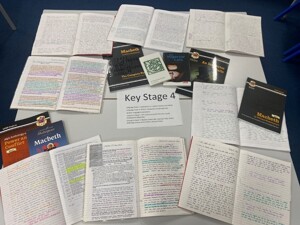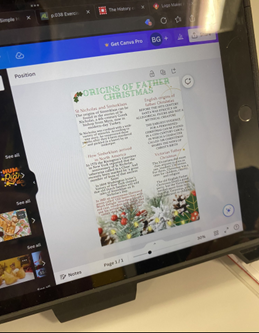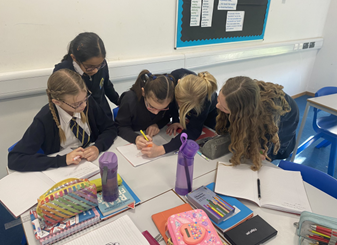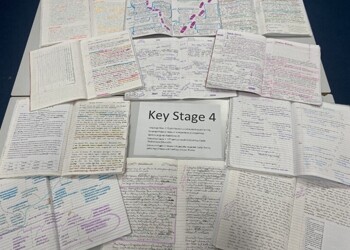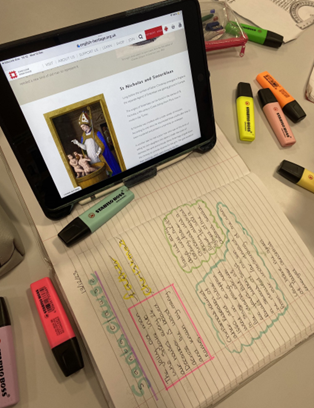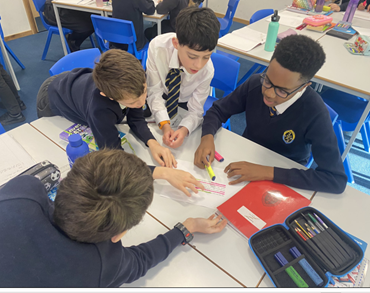English
English at Samuel Ryder Academy encourages students to read widely for pleasure and, ultimately, to use literature as a gateway to access the world and its different viewpoints and perspectives. We aim to develop analytical reading and critical thinking skills that will enable students to discover, evaluate and critique the texts that they engage with. Moreover, we strive to build a fluency in written and oral communication so that students are equipped to explore and present their thoughts, feelings and viewpoints and to produce students who have the confidence, articulacy, creativity and skills to contribute to their societies.
KS1
At Samuel Ryder Academy, we teach Phonics using the Active Learn Phonics Bug scheme. We use the resources provided to create fun and interactive ways for the children to learn Phonics. This is in the form of whole class sessions and in smaller groups.
The children in Early Years begin on phase 2 moving in phase 3, this is where they begin learning their initial sounds and start the process of blending to read words and simple sentences. They have Phonics sessions everyday which includes writing the sounds they have learnt and forming words.
In Year one the children begin by a recap of Phase 3 to ensure their knowledge is secure, with elements of Phase 4 and moving into Phase 5 ready for their Phonics screening check. By this time, they use digraphs and consonant blends to read longer words and sentences, this also includes the ‘alien words’ which appear on the screening check. They are encouraged to use these skills in their English sessions to support their writing.
In Year two the children recap Phase 5 to ensure their knowledge is secure and move through to Phase 6 where they learn spelling rules and how to apply these in their reading and writing.
As they move through the school, we build on these early foundations and our pupils take part in daily English lessons, where key skills are taught and developed to support their writing and reading. They engage in handwriting, spelling, grammar and guided reading sessions that build on their skills and develop their learning in line with the National Curriculum.
Each term, KS1 take part in ‘Take One Book’: this is where the same written outcome is produced for each year group, based on one text suitable for all age ranges. The written outcome is differentiated to suit the progression of skills required for each year group and displays a clear journey in writing progression throughout the primary phase. This piece of writing is used to support our termly assessment of writing against the age-related expectations for each year group. These texts explore themes which help to support the social, moral, spiritual and cultural development of the children.
|
|
Autumn 1 |
Autumn 2 |
Spring 1 |
Spring 2 |
Summer 1 |
Summer 2 |
|
Year 1 |
Labels, lists and signs, song and repetitive poems |
Funny rhymes, letters, Take One Book |
Instructions, poems and senses, traditional tales |
Stories with repeating patterns, information texts, humorous poems, Take One Book |
Fairy stories, traditional poems, stories with repeating patterns |
Fantasy, information texts, poems and nature, Take One Book |
|
Year 2 |
Class text Autumn: Toby and the Great Fire of London & Esio Trot, traditional tales (fiction), postcards and letters (fiction), poetry |
Take One Book, imaginary texts (fiction), instructions (non-fiction), information text (non-fiction) |
Class text Spring: Flat Stanley, poetry: the senses, stories involving fantasy (fiction), traditional tales from other cultures (fiction) |
Instructions (non-fiction), Take One Book, recount (non-fiction), humorous poems |
Class text Summer: The Tunnel, stories by the same author: Anthony Browne, information texts (non-fiction), stories about nature |
Quest and adventure stories (fiction), favourite poems, Take One Book |
KS2
Our English curriculum includes a balance of reading, writing, spelling and oracy which encompasses speaking and listening. The key skills of grammar, punctuation and spelling are explicitly taught and embedded into our English lessons to ensure a progression of skills throughout each year group.
Our writing and reading curriculum are book based, with each year group exploring texts throughout the year that cover a range of genres. These texts are used to enhance the writing lessons, with activities based around the book, as well as the class reading and exploring the book together. Each year group study at least one fiction, one non-fiction and one poetry module each half-term to ensure coverage of the different genres and produce written pieces on each of these. Within these, complex themes are explored which support the social, moral, spiritual and cultural development of the children.
Each term, our primary phase ‘Take One Book’ – this is where the same written outcome is produced for each year, based on one text suitable for all age ranges. The written outcome is differentiated to suit the progression of skills required for each year group and displays a clear journey in writing progression throughout the primary phase. This piece of writing is used to support our termly assessment of writing against the age-related expectations for each year group.
To embed reading, we have daily dedicated reading sessions which encompass the following: reading for pleasure within the library and inside the classroom environment, whole class reading and exploration of a text, reading fluency (to promote oracy and fluency) and VIPERS which covers the six domains of reading comprehension: vocabulary, inference, prediction, explanation, retrieval and summarising/sequencing.
|
|
Autumn 1 |
Autumn 2 |
Spring 1 |
Spring 2 |
Summer 1 |
Summer 2 |
|
Year 3 |
Class text Autumn: Fantastic Mr Fox, persuasive writing (past and present), humorous poems |
Take One Book, non-chronological reports, letters |
Class text Spring: The Boy Who Grew Dragons, narrative, diary entries, poetry around the world |
Take One Book, myths and legends, newspaper reports |
Class text Summer: The Iron Man, leaflets, story on emotions, shape poems |
Take One Book, instructions and explanations, plays and dialogues, riddles |
|
Year 4 |
Class text Autumn: The Butterfly Lion, non-chronological reports, myths and legends, image poems |
Take One Book, fiction, persuasive writing |
Class text Spring: The Firework Maker's Daughter, poetry, fables |
Take One Book, information text, performance poetry |
Class text Summer: The Last Bear, instructions and explanations, recounts |
Take One Book, nonsense poetry, fairy stories and play scripts |
|
Year 5 |
Class text Autumn: Who Let the God's Out?, classic fiction, autobiographies and biographies, observational poetry |
Take One Book, instructions and explanations, recounts |
Class text Spring: Kensuke's Kingdom, spooky stories, reports and journalistic writing, poems on a theme |
Take One Book, non-chronological reports, arguments and debate |
Class texts Summer: Holes, Shakespeare, persuasive writing, classic fiction, classic poems |
Take One Book, letters and correspondence, short stories |
|
Year 6 |
Class text: Letters from the Lighthouse historical stories, freeform poetry, recounts and letters |
Take One Book, instructions and explanations, blogs and reports, narrative poems |
Class text Spring: Harry Potter and The Philosopher's Stone, story openers, stories with flashbacks, information and explanation texts, narrative texts |
Take One Book, persuasive writing, newspaper and dialogues, classic poetry |
Class text Summer: Clockwork, modern classic fiction, dialogue poetry, information texts |
Take One Book, chronological reports, choral and performance poetry |
KS3
Our Key Stage 3 curriculum is designed to expose students to a broad and rich range of texts from a variety of time periods and cultures. We build on the reading comprehension and inference skills covered in Key Stage 2, as well as introducing and developing the skill of reading analysis. Students are taught through a range of stimuli to develop their writing skills in fiction, non-fiction and poetry. We equip students with knowledge and skills to help them engage confidently and critically with texts and media that they may encounter outside school. This also helps them engage with more complex concepts and hone their higher order thinking.
Students engage in units focusing on the use of language in journalism as well as choosing texts that explore a broad range of perspectives. Oracy is an important focus of our Key Stage 3 curriculum. By integrating speaking and listening opportunities into the units of work, students develop their questioning, debating and presenting skills.
In addition, students develop their personal learning and thinking skills by integrating team work, participation, research, reflection and self-management tasks into our lessons and objectives. Each of our units of work are carefully crafted to explore students’ spiritual, moral, social and cultural development. The literature texts we study lend themselves to understanding the heritage of British culture and how this affects our lives today.
As well as treasuring books, the English department recognise the importance of technology in the study of our language. Students use their iPads to research tasks, access teacher handouts, read supporting materials and use apps to create creative pieces.
|
|
Autumn |
Spring |
Summer |
|
Year 7 |
Transition unit - short stories; identity poetry |
The Hunger Games, Suzanne Collins |
The Tempest, William Shakespeare; |
|
Year 8 |
War of the Worlds, H. G. Wells; Romeo and Juliet, William Shakespeare |
World Poetry; Journalistic writing |
Frankenstein, Philip Pullman; Victorian literature |
|
Year 9 |
Diverse shorts; Victorian Christmas |
The language of dystopia; spoken language |
Poet X, Elizabeth Acevedo; Power and Conflict anthology |
KS4
Developing learners that are discerning and curious readers, as well as fluent and confident communicators, remains our aspiration at GCSE. We build on and hone the reading, writing and speaking and listening skills taught at key stage 3 to ultimately equip students with lifelong tools to be successful adults.
We follow the AQA specification in both English language and literature qualifications at GCSE. The course is rigorous and develops skills in reading, writing, oracy and listening through a range of text types and activities. This is a linear course and students complete four examinations (two for English literature and two for English language) at the end of year 11, as well as an internally assessed speaking and listening presentation, which is completed during the summer term of year 10. Throughout the key stage, students are assessed using exam style questions that helps identify their emerging strengths and areas for further development in advance of the external exams.
The texts that are studied for English literature are: A Christmas Carol by Charles Dickens, Macbeth by William Shakespeare, An Inspector Calls by JB Priestley and an anthology of poems based around the theme ‘Power and Conflict’.
Please find links to the exam board website below:
https://www.aqa.org.uk/subjects/english/gcse/english-language-8700
https://www.aqa.org.uk/subjects/english/gcse/english-literature-8702
Both the literature texts and the language study expose students to new ideas and older concepts which we study afresh. In this way, students are challenged and build on their repertoire of skills. For example, by studying the context of the literature texts, students learn about the historical context of ideas that were prevalent at the time and how they have helped shape modern life. Students are encouraged to widen their research on the context of these books and use discussion to consider varied beliefs of our society including economic and political factors. By broadening their social awareness, students are able to understand more about the texts we study and discuss the culture they are a part of.
As well as the texts we study for the exam, students are encouraged to use their iPads to research further context and access supporting exam material to aid their discussions of the issues that come up. The wealth of revision resources available at their fingertips enable them to find the right level of challenge and well as opportunities for revision and reflection.
|
|
Autumn |
Spring |
Summer |
|
Year 10 |
Power and conflict poetry; A Christmas Carol |
An Inspector Calls, J. B. Priestley; English language paper 2 |
Unseen poetry; Macbeth |
|
Year 11 |
English language paper 1; power and conflict poetry; |
English language paper 2; An Inspector Calls, J. B. Priestley; unseen poetry |
Revision and interleaving of all topics |
Beyond GCSE
There are two A-Level courses that follow directly from the GCSE in English language and English literature (as separate courses, not combined).
A-Level English Language
Awarding body: AQA
Specification number: 7702/1
The study of English language at A-level is a fantastic look at the history and future of our country’s traditions and culture. Language, omnipresent in our daily lives, permeates every interaction and scenario, from casual conversations to persuasive marketing messages.
Through the lens of A-Level English language, students delve into the mechanics of communication, unravelling the layers of meaning behind every word. This comprehensive course offers insights into how language is wielded in various contexts, from societal influences to the art of persuasion.
From dissecting the impact of a cleverly crafted slogan to analysing the nuances of storytelling, students develop a keen understanding of language's subtle yet profound effects on our thoughts and actions. With a focus on language variation, societal dynamics, and textual analysis, they sharpen their analytical skills and gain a deeper appreciation for the power of language.
The course structure is meticulously designed to foster creativity and critical thinking. Through engaging tasks and thought-provoking discussions, students hone their writing prowess, adapt their style for different audiences, and master the art of argument.
There are two exams and two NEAs:
|
Paper 1: Language, the Individual and Society What's assessed • Textual variations and representations • Children's language development (0–11 years) • Methods of language analysis are integrated into the activities assessed • Written exam: 2 hours 30 minutes • 100 marks • 40% of A-level Questions Section A – Textual variations and representations Two texts (one contemporary and one older text) linked by topic or theme • A question requiring analysis of one text (25 marks) • A question requiring analysis of a second text (25 marks) • A question requiring comparison of the two texts (20 marks) Section B – Children's language development A discursive essay on children’s language development, with a choice of two questions where the data provided will focus on spoken, written or multimodal language (30 marks) |
|
Paper 2: Language Diversity and Change What's assessed • Language diversity and change • Language discourses • Writing skills • Methods of language analysis are integrated into the activities assessed • Written exam: 2 hours 30 minutes • 100 marks • 40% of A-level Questions Section A – Diversity and change One question from a choice of two: either: an evaluative essay on language diversity (30 marks) or: an evaluative essay on language change (30 marks) Section B – Language discourses Two texts about a topic linked to the study of diversity and change • A question requiring analysis of how the texts use language to present ideas, attitudes and opinions (40 marks) • A directed writing task linked to the same topic and the ideas in the texts (30 marks) |
|
Non-exam Assessment: Language in Action What's assessed
• Methods of language analysis are integrated into the activities assessed • 100 marks • 20% of A-level • Assessed by teachers and moderated by AQA |
A-Level English Literature
Awarding body: AQA
Specification number: 7712/4.1
Through this course, students study a range of literature following the theme of 'Love Through the Ages'. They study Shakespeare's tragic Othello. As well as the more modern tragedy of A Streetcar Named Desire by Tennessee Williams, which reveals the plight of a pitiful woman that loses her grip on reality when faced with the harsh consequences of life. Students also study F. Scott Fitzgerald's twentieth century classic: The Great Gatsby. We also study more modern works, such as The Handmaid's Tale by Margaret Attwood and a collection of poems by Carol Ann Duffy. In addition to this, students study a range of unseen prose and poetry in accordance with the 'Love Through the Ages' theme. Students also pursue their own interests through the completion of an independent critical study based on two novels of their choice.
This course has two examinations:
- Paper 1: Love Through the ages
- Paper 2: Texts in shared contexts
Students are also assessed through an independent critical study. They will complete both exams at the end of year 13. Over the course of the two years, students complete various timed essays and examination preparation in order to get a sense of the format and expectations of the final A-Level exam. Through this, students are better placed to track their own progress and learn to perfect their written style.
Samuel Ryder Academy has maintained an outstanding track record with A-Level outcomes. Over the last few years, 100% of the cohort has achieved an A*-C grade. This is due, in part, to the wider reading around the subject that students complete, this is vital to success in A-Level English literature. As this is a linear course studied over two years, successful students show rigour with their note-taking and home-study, which will allow them to achieve excellent outcomes at the end of year 13. In addition, the English staff have selected this course because of their personal interest in the authors and passion for the texts.
Wider Curriculum
The extracurricular offer in English is wide-ranging and we think there is something for everyone. As some examples, in the last year we have hosted a read-a-thon, a spelling bee, several creative writing competitions – including national ones where our students were very successful – and more. Clubs include poetry, short story, school newspaper with the ever popular and growing SRA Times, Grade 9 club for aspirational students in Key Stage 4 and Book Club for A-Level students.
To build on students’ knowledge, understanding and enjoyment of texts we put on a range of performances and productions across all phases from Reception to Year 13, invite acting troupes, for example the Globe Players and the Quantum Theatre in to perform productions such as A Christmas Carol, Macbeth and An Inspector Calls. We have fantastic workshops during English Week; in the past we have talks and workshops from authors, illustrators and anime artists.
Publishing, journalism and teaching are to name but a few careers that English literature students go in to. However, this is an academic course that requires depth and breadth of study; as a result, all universities look favourably on students that have English literature as one of their A-Levels.
Useful Links
ActiveLearn: Login (activelearnprimary.co.uk)
https://www.aqa.org.uk/subjects/english/gcse/english-language-8700
https://www.aqa.org.uk/subjects/english/gcse/english-literature-8702
English Revision - PMT (physicsandmathstutor.com)
A level: Massolit – Short video lectures from the world's best academics
